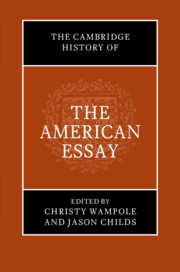Book contents
- The Cambridge History of the American Essay
- The Cambridge History of the American Essay
- Copyright page
- Contents
- Acknowledgments
- Notes on Contributors
- Introduction
- Part I The Emergence of the American Essay (1710–1865)
- Part II Voicing the American Experiment (1865–1945)
- Part III Postwar Essays and Essayism (1945–2000)
- 20 The Essay and the Twentieth-Century Literary Magazine
- 21 Germans in Amerika: Written Possibility, Uninhabitable Reality
- 22 The Essay and the American Left
- 23 The Native American Essay
- 24 Conservatism and the Essay
- 25 Opinions and Decisions: Legal Essays
- 26 World War Two to #MeToo: The Personal and the Political in the American Feminist Essay
- 27 Self-Portraits in a Convex Mirror: The Essay in American Poetry
- 28 The American Essay and (Social) Science
- 29 Philosophy as a Kind of Writing
- 30 The Essay and Literary Postmodernism: Seriousness and Exhaustion
- Part IV Toward the Contemporary American Essay (2000–2020)
- Recommendations for Further Reading
- Index
26 - World War Two to #MeToo: The Personal and the Political in the American Feminist Essay
from Part III - Postwar Essays and Essayism (1945–2000)
Published online by Cambridge University Press: 28 March 2024
- The Cambridge History of the American Essay
- The Cambridge History of the American Essay
- Copyright page
- Contents
- Acknowledgments
- Notes on Contributors
- Introduction
- Part I The Emergence of the American Essay (1710–1865)
- Part II Voicing the American Experiment (1865–1945)
- Part III Postwar Essays and Essayism (1945–2000)
- 20 The Essay and the Twentieth-Century Literary Magazine
- 21 Germans in Amerika: Written Possibility, Uninhabitable Reality
- 22 The Essay and the American Left
- 23 The Native American Essay
- 24 Conservatism and the Essay
- 25 Opinions and Decisions: Legal Essays
- 26 World War Two to #MeToo: The Personal and the Political in the American Feminist Essay
- 27 Self-Portraits in a Convex Mirror: The Essay in American Poetry
- 28 The American Essay and (Social) Science
- 29 Philosophy as a Kind of Writing
- 30 The Essay and Literary Postmodernism: Seriousness and Exhaustion
- Part IV Toward the Contemporary American Essay (2000–2020)
- Recommendations for Further Reading
- Index
Summary
This chapter explores the post–World War II period in the United States, charting the postwar feminist essay in three directions: first, as a site of consciousness-raising during feminism’s second wave; second, as a space for feminist critiques of feminisms during the so-called third wave; and third, in its contemporary iteration in a revived consciousness-raising context: the #MeToo essay. The chapter draws together formally and contextually diverse texts into a longer conversation about how the essay can be read as a politicized and politicizing literary form. These texts include nonfiction subgenres often thought to be subordinate to the essay: an article, a collectively authored set of papers, a prose poem, a memoir, and a victim impact statement. The chapter argues that what makes these texts “feminist” and “essays” – despite significant formal differences – is their shared engagement with critical, documentary, and experiential literary modes and their stakes in connecting the individual to politically invested collectives, past and future. These five essays explicitly address gender and contingent forces of oppression that both bond and trouble emancipatory collectives.
Keywords
- Type
- Chapter
- Information
- The Cambridge History of the American Essay , pp. 441 - 459Publisher: Cambridge University PressPrint publication year: 2023



